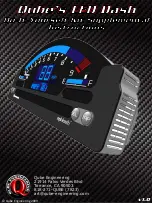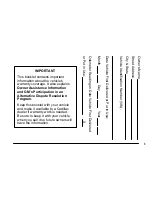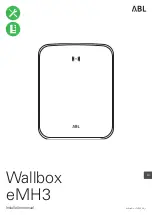
Restraint system functionality
When the vehicle is switched on, a self-test is per-
formed, during which the
6
restraint system
warning lamp lights up. It goes out no later than a
few seconds after the vehicle is started. The com-
ponents of the restraint system are then func-
tional.
Malfunctioning restraint system
A malfunction has occurred in the restraint sys-
tem if:
R
the
6
restraint system warning lamp does
not light up when the vehicle is switched on
R
the
6
restraint system warning lamp lights
up continuously or repeatedly during a journey
&
DANGER Risk of fatal injuries due to
restraint system malfunctions
Components in the restraint system may be
activated unintentionally or not deploy as plan-
ned in an accident. In the event of an acci-
dent, the high-voltage on-board electrical sys-
tem may not be deactivated as intended.
You may suffer an electric shock if you touch
the damaged components of the high-voltage
on-board electrical system.
#
Have the restraint system checked and
repaired immediately at a qualified spe-
cialist workshop.
#
After an accident, switch off the vehicle
immediately.
Function of the restraint system in an accident
How the restraint system works depends on the
severity of the impact detected and the apparent
type of accident:
R
Frontal impact
R
Rear impact
R
Side impact
R
Rollover
The activation thresholds for the components of
the restraint system are determined based on the
evaluation of the sensor values measured at vari-
ous points in the vehicle. This process is pre-emp-
tive in nature. The triggering/deployment of the
components of the restraint system must take
place in good time at the start of the collision.
Factors which can only be seen and measured
after a collision has occurred cannot play a deci-
sive role in airbag deployment. Nor do they pro-
vide an indication of airbag deployment.
The vehicle may be deformed significantly without
an airbag being deployed. This is the case if only
parts which are relatively easily deformed are
affected and the rate of vehicle deceleration is
not high. Conversely, an airbag may be deployed
even though the vehicle suffers only minor defor-
mation. If very rigid vehicle parts such as longitu-
dinal members are hit, this may result in suffi-
ciently high levels of vehicle deceleration.
Depending on the detected deployment situation,
the components of the restraint system can be
activated or deployed independently of each
other:
R
Seat belt tensioner: frontal impact, rear
impact, side impact, rollover
R
Driver's airbag, front passenger airbag: frontal
impact
R
Knee airbag: frontal impact
98
Occupant safety
ohne
Summary of Contents for EQS 2021
Page 1: ...EQS Operator s Manual ohne...
Page 61: ...ohne...
Page 62: ...Left hand drive vehicles with central display 60 At a glance Cockpit central display ohne...
Page 64: ...Left hand drive vehicles with MBUX hyperscreen 62 At a glance Cockpit MBUX Hyperscreen ohne...
Page 66: ...Standard driver display 64 At a glance Indicator and warning lamps standard ohne...
Page 70: ...68 At a glance Overhead control panel ohne...
Page 72: ...70 At a glance Door operating unit and seat adjustment ohne...
Page 74: ...72 At a glance Control settings in the rear passenger compartment ohne...
Page 76: ...74 At a glance Emergencies and breakdowns ohne...
Page 925: ...ohne...
Page 926: ...ohne...
















































